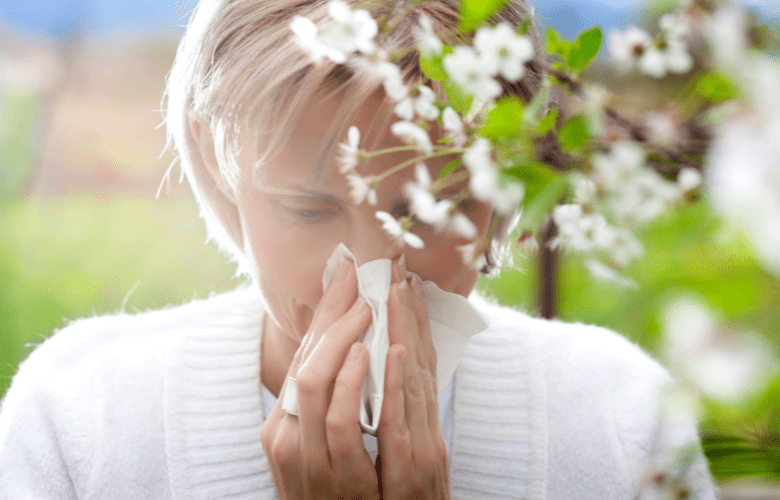Top 10 Natural Methods to Get Seasonal Allergies Under Control
Blooming flowers, growing plants, returning birds. Isn’t spring the most beautiful season of the year? Unfortunately, not if you’re one of the 50 million Americans who’ve got seasonal allergies. You could be forced to spend more days indoors rather than venturing outside to see the world. The good news? You can bring your allergies under control with 10 proven natural remedies. These simple adjustments can significantly improve how well your body manages and combat allergies.
What are seasonal allergies?
Like other types of allergies, seasonal allergies (aka allergic rhinitis) are brought on by your immune system misidentifying and overreacting to an allergen, such as pollen. An allergen is a substance in the environment that causes an allergic reaction.
When your body encounters foreign invaders from your home or outdoor sources, it triggers the production of inflammatory compounds, including histamine, to eliminate these intruders. The release of these chemicals results in too much mucus and itching, two symptoms frequently seen in allergic reactions.
Depending on your allergic triggers and where you reside, seasonal allergies happen at a specific season of the year. You could also suffer seasonal allergies in more than one season.
Seasonal allergies frequently start in the spring and are less prevalent in the winter. The condition is also known as hay fever, coined from the summertime hay-cutting season. This term, however, is misleading because symptoms may not just manifest in the summer. Also, it never includes a fever.
What causes seasonal allergies?
Airborne Irritants
Seasonal allergy symptoms can occur when airborne irritants enter your eyes, nose, and throat. The most common allergens are pollens from wind-pollinated grasses, trees, and weeds.
- Spring: Usually trees (alder, ash, birch, beech, elm, maples, oak, olive, and poplar)
- Summer: Grasses (Bermuda, sweet vernal, timothy, and Johnson grass) and weeds (English plantain and Russian thistle)
- Fall: Usually weeds (ragweed, pigweed, tumbleweed)
Indoor Allergens
If you experience allergies in winter, they may be caused by indoor irritants like molds. These are fungi that develop in wet environments (usually in bathrooms and basements) and spread through spores.
A variety of substances can also provoke allergic reactions, including:
- House dust
- Fabrics
- Dust mites
- Cockroach droppings
- Animal dander
- Houseplants
Other Contributing Triggers
The immune system can also be dysfunctional due to certain lifestyle, dietary, and toxic exposure patterns, contributing to immunological dysregulation. These include:
- Poor gut health
- Reduced sleep
- Chronic stress
- Toxin exposure
Symptoms of Seasonal Allergies
Seasonal allergy symptoms can range in severity from moderate to severe and can include:
- Nasal and ear congestion
- Runny or stuffy nose
- Post nasal drip
- Sore throat
- Sneezing
- Wheezing
- Coughing
- Itchy and watery eyes
- Red, puffy eyes
- Skin rashes
- Headaches
- Shortness of breath
10 Natural Remedies for Seasonal Allergy Relief
1. Improve indoor air quality.
Using an air conditioner equipped with a HEPA filter is one of the best ways to lessen indoor air pollution and cool your home during the summer. As opposed to using ceiling fans, it is much safer. It filters the air to capture pollen, dust, and pet dander before they enter your sinuses, reducing the entry of allergens into your home.
2. Reduce your exposure to allergens.
Check your local weather network or a pollen count checker for recent pollen counts and forecasts. Stay indoors when pollen levels are high. At times of the year when your hay fever is persistent:
- Shut the doors and windows of your house, car, and office.
- If you must perform outside chores, wear a hat and mask to protect your face from pollen, especially on windy days.
- Avoid cigarette smoke because it can make hay fever symptoms worse.
- Take off your shoes and outerwear as soon as you get home. Shower and change into something free of seasonal allergens.
3. Wash your bedding and clothes regularly.
When dust, dander, pollen, and other allergy triggers enter your home through your bedding and clothing, they can irritate your immune system. Keep these particles to a minimum by regularly laundering your clothes, bedding, and towels.
4. Heal and support your gut.
A healthy gut microbiome means abundant probiotics or “good” bacteria. Probiotics can ease seasonal allergy symptoms through their ability to regulate several immune system mediators.
In addition, dietary fiber supports healthy gut flora by providing food for good gut bacteria. By controlling the release of histamine, among other processes, dietary fiber also lessens the likelihood of allergic reactions.
5. Support your immune function with supplements.
Certain nutrients may help with allergic responses, including:
- DAO supplement: maintains healthy histamine levels to avoid histamine-related symptoms.
- Nutrients: (copper, vitamin B6, and vitamin C) support histamine breakdown and DAO production.
- N-acetyl cysteine: can help alleviate symptoms of nasal and pulmonary congestion.
- Quercetin: prevents the release of histamine, reducing your body’s inflammatory reaction to allergens.
- Spirulina – can reduce symptoms of seasonal allergies, including nasal discharge, congestion, and sneezing.
6. Avoid stress and get consistent quality sleep.
You are more likely to wake up feeling rested and prepared to take on the day when you consistently receive the amount of sleep advised for your age. But, when you’re anxious, your body releases histamine and other substances that cause allergic symptoms.
7. Flush your nasal passages.
Rinsing your nasal passages with homemade saline solution is an affordable and effective way to relieve nasal congestion. Rinsing flushes out mucus and allergens from your nose. Something as easy as a hot shower can also help relieve the nasal congestion often linked with allergies.
8. Reduce histamine in your diet.
Avoiding histamine through the diet is crucial. Consult a functional medicine nutrition specialist to design the right plan for you to avoid the risk of nutrient deficiencies. Identifying and eliminating food allergies from your diet can help alleviate your symptoms.
9. Take TCM herbs.
See a qualified practitioner for a customized herbal formula based on your unique symptoms. Traditional Chinese Medicine herbal formulas have been shown to reduce the severity of allergic rhinitis, including:
- Xin Yi Qing Fei Tang
- Xiao Qing Long Tang
- Xin Yi San
It’s always important to remember that Chinese herbal formulas should be tailored to your specific symptoms by a board-certified herbalist trained in Chinese herbs to prevent any adverse reactions.
10. Try acupuncture.
Effective relief from allergy symptoms is possible with acupuncture. A 2004 study found that acupuncture increased the number of symptom-free days while easing nasal congestion symptoms.
The Bottom Line
If you feel like you’ve done everything to lessen seasonal allergy symptoms, don’t give up! Start getting the care you need by reaching out to us for a free consultation. We can help you implement several natural methods to provide seasonal allergy relief safely and effectively – from simple lifestyle changes to supplements and acupuncture.











